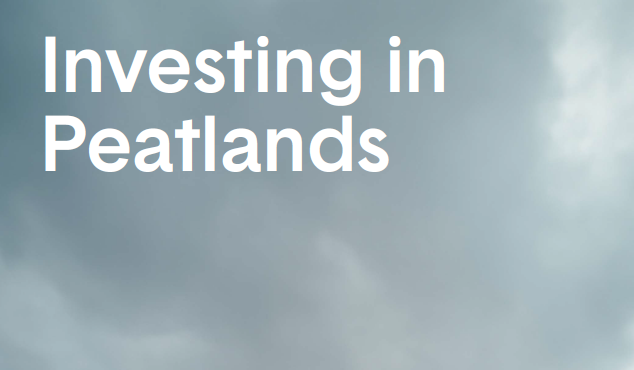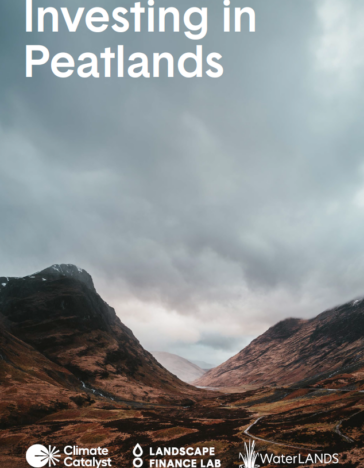
Peatland landscapes represent critical investment opportunity, says new report
-
Peatlands
Peatlands, which store twice as much carbon as all the world’s forests, represent an emerging investment opportunity, but more must be done to harness their huge potential, according to a new report from 15 leading global and European climate, conservation and finance organisations.
The publication, ‘Investing in Peatlands’, offers a comprehensive guide for nature-focused investors seeking peatland opportunities, and sets out recommendations for growing the emerging peatland finance industry. Published by the Landscape Finance Lab, Climate Catalyst and the EU Horizon 2020 WaterLANDS programme, it brings together contributions from partners spearheading landscape-scale peatland restoration projects and investments across the UK and Europe. Current peatland investments tend to be small, but case studies featured throughout the report showcase how investing in this nascent asset class at a landscape scale provides investors with a unique opportunity to deliver financial returns from rapidly developing carbon, biodiversity and water markets, whilst supporting a range of meaningful co-benefits including climate resilience, nature regeneration, green business and job creation, and enhanced cultural and leisure amenities for communities.
An example of this approach can be seen in the Flow Country Green Finance Initiative. Covering 400,000 hectares in the north of Scotland, it aims to unlock public and private finance through a blended finance model, generating returns from the sale of carbon payments for successful restoration action, and ensuring land-owners and communities get a fair return. Other example case studies featured in the report include The toMOORow Initiative (Germany), the Landscape Rewilding Programme (Finland), LIFE-IP Wild Atlantic Nature and FarmPEAT Results Based Agri-Environment Programmes (Ireland), the Great North Bog and Moors for the Future Partnership (UK), Peatland Finance Ireland (Ireland), and WaterLANDS (Europe).
Despite healthy peatlands being our planet’s most concentrated, space-efficient, natural carbon stores and sinks, they have been chronically undervalued. In order for peatland restoration to have meaningful economic, social and environmental impacts, investors should focus on helping to direct financial flows towards landscape-level initiatives, which have distinct advantages:
- Economies of scale: This approach allows investments to be pooled into portfolios of projects and for the development of financial mechanisms that can achieve investment at scale.
- Stakeholder support: Working with stakeholders, including NGOs, land-owners, business, government and local communities, can create a strong enabling environment for investment and secure support.
- Enhanced ecosystem resilience: Landscape-scale projects cover large areas and a variety of ecosystems, increasing the project resilience.
- Co-benefits: Such investments can support ecological and social co-benefits such as ensuring health water flows and providing local business incentives such as micro-credit schemes.
- Risk mitigation: By their nature, these projects are run in partnerships with various stakeholders that can help share the financial and operational risks.
The report highlights three clear areas for the investment community to support the scaling up of these investments:
- Catalyst private sector capital: The report urges investors to work with a range of actors both within and outside the investment community to deploy capital into pilot projects to develop proof of concept for peatland restoration projects, and to work with projects to develop robust methodologies and monitoring systems to assess returns on investment.
- Adopt science-based target setting and disclosure: It says investors should use frameworks such as the Taskforce for Nature-related Financial Disclosures, to adopt carbon and nature accounting methodologies and share peatland restoration data using robust standards to build trust and transparency.
- Share best practice across the public and private sectors: It urges investors to showcase the opportunity for investing in peatland restoration, and highlight investors’ needs with governments, communities and other stakeholders to enable capital to flow.
Downloads
Contacts
For more information or to arrange interviews, contact:
Sabrina Russo, Communications Manager, Landscape Finance Lab:[email protected]
Laoise Dillon, Communications Lead for WaterLANDS:[email protected]
Harsheen Patel, Digital Manager, Climate Catalyst:[email protected]
Notes to editors
The report was a joint project, with contributions from:
- Climate Catalyst
- European Investment Bank
- European Peatlands Initiative
- Flow Country Partnership
- HORIZON Group
- IUCN UK Peatland Programme
- Landscape Finance Lab
- LIFE IP Wild Atlantic Nature
- Michael Succow Foundation
- NatureScot
- North Highland Initiative
- Peatland Finance Ireland
- Snowchange Cooperative, Finland
- UNEP Global Peatlands Initiative
- University College Dublin
- WaterLANDS
- Wetlands International
About the Landscape Finance Lab
The Landscape Finance Lab bridges the gap between conservation practitioners and investors, supporting the design, structuring and financing of sustainable landscape programmes that deliver impacts on the Global Sustainable Development Goals.
About Climate Catalyst
Climate Catalyst strengthens collaboration and mobilises new actors on pivotal climate challenges. We work behind the scenes with diverse stakeholders in Europe and Asia to identify opportunities where action to date has been limited, the potential for collaboration is high, and there’s significant potential to reduce greenhouse gas emissions. We then bring together renowned experts and new entrants to deliver creative campaigns that build power and secure decisive action by governments to ensure we reach our vision of a just, prosperous world in which global temperature rise is limited to 1.5°C. To date, we’ve sparked collective action in support of peatlands protection in Europe and to secure positive shifts towards steel decarbonisation in India.
About WaterLANDS
WaterLANDS is a €23.6 million, 5-year project funded by Horizon 2020 that aims to restore wetlands across Europe and lay the foundations for upscaling protection across wider areas. The project is undertaking hands-on restoration of wetland sites and creating best-practice models that can be applied to wetland restoration at other sites.

